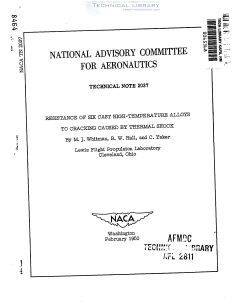naca-tn-2037
- Version
- 120 Downloads
- 1.02 MB File Size
- 1 File Count
- December 14, 2016 Create Date
- December 14, 2016 Last Updated
National Advisory Committee for Aeronautics, Technical Notes - Resistance of Six Cast High Temperature Alloys to Cracking Caused by Thermal Shock

An investigation was undertaken to determine the relative
resistance of six cast high-temperature alloys to cracking caused
by thermal shock. The thermal-shock evaluation unit utilized a
controlled water quench of the symmetrical edge of a uniformly
heated, modified wedge-shaped specimen. The specimens were heated
at a uniform temperature of 17500 F for 1 hour and water quenched
at 45° F. This cycle was repeated until thermal-shock failure
occurred. The order of decreasing resistance to thermal-shock
cracking of the alloys was 3-816, 3-590, Vitallium, 422-19, X-40,
and Stellite 6.
The heating-and-quenching cycle produced elongation of the
quenched edge. Measurements of these deformations were made during
the cyclic tests. The total elongation of the quenched edge at
failure was found to increase with the resistance of the material
to thermal shock. In this investigation, materials having similar
thermal properties, such as coefficient of linear expansion, con-
ductivity, and specific heat, were shown to have widely differing
resistances to thermal shock. Metallurgical examination of the
alloy structure and study of the nature of crack propagation
yielded no correlation between structural characteristics and
resistance to cracking caused by thermal shock.
An analysis of the manner in which the thermal-shock crack
formed and progressed into the specimen and an examination of
available data on the notch impact strength of cast high-temperature
alloys indicated that there might be a relation between notch
impact Strength and resistance to cracking caused by thermal shock.
The operating conditions of aircraft gas turbines subject
certain components to large and sudden temperature gradients, which
result in thermal stresses that are, in some cases, either a prime
or contributing cause of component failure. For example, gas-
turbine blades are subjected to thermal stresses when the engine
is started, accelerated, decelerated, or stopped. Rapid cooling
of the turbine-blade edges during deceleration and stopping causes
contraction of these thin sections. This contraction is resisted
by the adjacent hotter metal and as a result the cooler edges are
subjected to sudden tensile stresses. Rapid heating produces comr
pressive stresses in the same areas.
| File | Action |
|---|---|
| naca-tn-2037 Resistance of Six Cast High Temperature Alloys to Cracking Caused by Thermal Shock.pdf | Download |

Comment On This Post